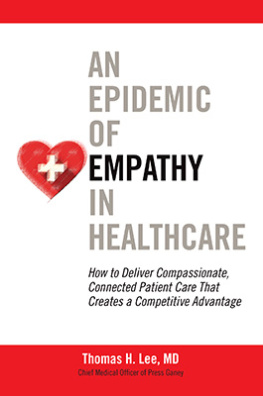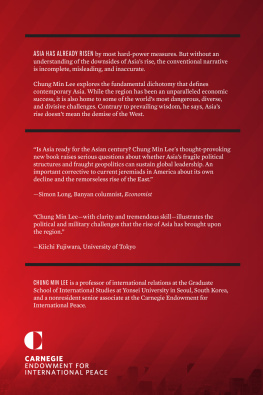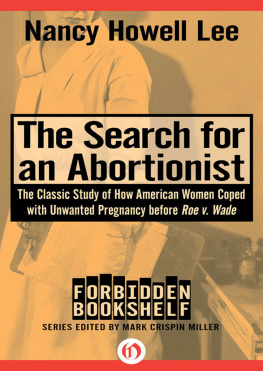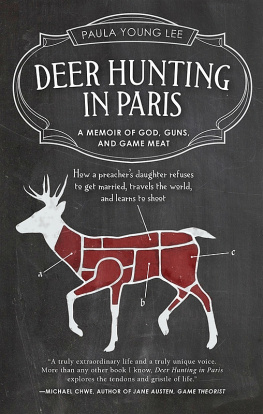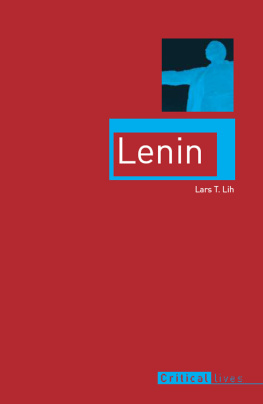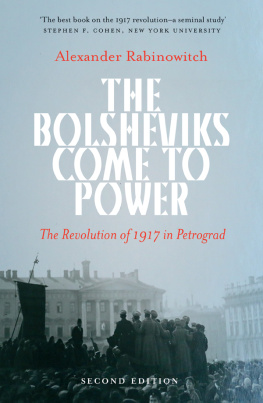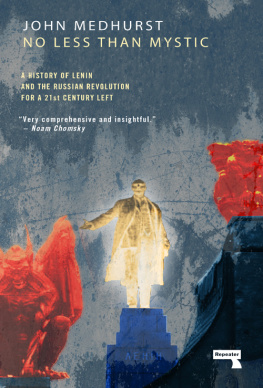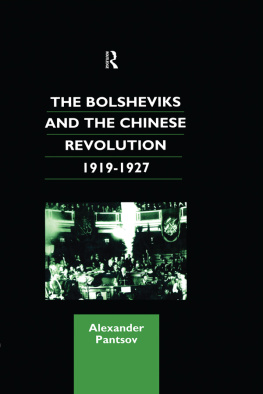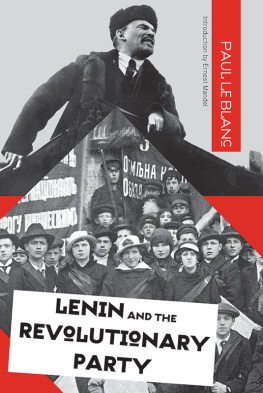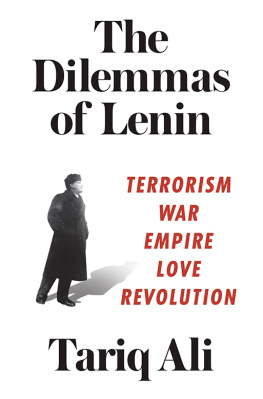LENIN AND REVOLUTIONARY RUSSIA
QUESTIONS AND ANALYSIS IN HISTORY
Edited by Stephen J. Lee, Sean Lang and Jocelyn Hunt
Other titles in this series:
Modern History
Imperial Germany, 18711918
Stephen J. Lee
The Weimar Republic
Stephen J. Lee
Hitler and Nazi Germany
Stephen J. Lee
The Spanish Civil War
Andrew Forrest
The Cold War
Bradley Lightbody
Stalin and the Soviet Union
Stephen J. Lee
Parliamentary Reform, 17851928
Sean Lang
British Foreign and Imperial Policy, 18651919
Graham D. Goodlad
The French Revolution
Jocelyn Hunt
The First World War
Ian C. Cawood and David McKinnon-Bell
Anglo-Irish Relations, 17981922
Nick Pelling
Churchill
Samantha Heywood
Mussolini and Fascism
Patricia Knight
Early Modern History
The English Wars and Republic, 16361660
Graham E. Seel
The Renaissance
Jocelyn Hunt
Tudor Government
T. A. Morris
Spain, 14741598
Jocelyn Hunt
The Early Stuart Kings, 16031642
Graham E. Seel and David L. Smith
LENIN AND REVOLUTIONARY RUSSIA
STEPHEN J. LEE
ROUTLEDGE
LondonandNew York
First published 2003
by Routledge
11 New Fetter Lane, London EC4P 4EE
Simultaneously published in the USA and Canada
by Routledge
29 West 35th Street, New York, NY 10001
Routledge is an imprint of the Taylor & Francis Group
This edition published in the Taylor & Francis e-Library, 2007.
To purchase your own copy of this or any of Taylor & Francis or Routledges collection of thousands of eBooks please go to www.eBookstore.tandf.co.uk.
2003 Stephen J. Lee
All rights reserved. No part of this book may be reprinted or reproduced or utilised in any form or by any electronic, mechanical, or other means, now known or hereafter invented, including photocopying and recording, or in any information storage or retrieval system, without permission in writing from the publishers.
British Library Cataloguing in Publication Data
A catalogue record for this book is available from the British Library
Library of Congress Cataloging in Publication Data
Lee, Stephen J., 1945
Lenin and revolutionary Russia / Stephen J. Lee.
p. cm.(Questions and analysis in history)
Includes bibliographical references and index.
1. RussiaPolitics and government18941917. 2. Soviet UnionPolitics and government19171936. 3. Russian Communism (bolsheviks)History. 4. CommunismSoviet UnionHistory. 5. Lenin, Vladimir Ilych, 18701924. I. Title. II. Series.
DK246.L427 2003
320.94709041dc21 2003045912
ISBN 0-203-93011-8 Master e-book ISBN
ISBN13: 978-0-203-93011-3 Master e-book ISBN
ISBN13: 978-1-134-44600-1 ePub ISBN
ISBN 0-415-28717-0 (hbk)
ISBN 0-415-28718-9 (pbk)
For Charlotte
CONTENTS
INTRODUCTION
The Questions and Analysis series is based on the belief that the student actively benefits from explicit interpretation of key issues and help with source-based technique. Each volume therefore separates narrative from analysis and sources; it follows an overall structure of Background Narrative, Analyses, and Sources with questions and worked answers.
This volume, Lenin and Revolutionary Russia, is the first in the series to add another dimension. Sixth-form and university courses have given increasing importance to historical debates, requiring proficiency in historiography as well as history. The revised format takes this development into account.
only one set of Sources, the subject matter is largely historiographical and therefore related to A2.
This book also aims to interest students in higher education, who might find a background to history and historiography helpful for their chosen topic. The Sources and Questions offer a variety of approaches and techniques that are likely to provide at least a starting point for further analysis. The series as a whole has kept in mind the interest of an increasingly sophisticated general reader, perhaps coming to a particular topic as a result of television, which emphasises new ideas in history.
The subject of this volume could not be more controversial. Lenins reputation has been subject to a wider range of interpretations than that of any other major historical figure. He was a force for fundamental good or evil. He was crucial for the growth of revolution in Russia or peripheral to it. He was a liberator or an autocrat. He based his actions on ideas or his ideas followed his actions. He was consistent or inconsistent. He led the masses or followed them. His plans came to fruition under Stalin or were betrayed by Stalin. And finally, the Soviet regime collapsed in spite of his influence or because of it.
It is hoped that the student or general reader will want to contribute to the debate in these chapters. Such a range of ideas is bound to stimulate more. Provided that they can be substantiated, they are all valid and they all count. This is what makes history so creative.
CHRONOLOGY
Russia used the Julian calendar under Tsariam, so in 1917 the two revolutions may be termed February and October (Julian) or March and November (Gregorian). The Julian calendar is used for all dates in this book up to 1918: The Bolsheviks adopted the Gregorian calendar in February 1918.
| 1883 | Formation of the Emancipation of Labour (a Marxist group) by Plekhanov. |
| 1895 | Formation of the Fighting Union for the Liberation of the Working Class by Lenin. |
| 1898 | Publication of Lenins Tasks of the Russian Social Democrats. Formation of Russian Social Democratic Labour Party (RSDLP) from the Emancipation of Labour and the Fighting Union for the Liberation of the Working Class. |
| 1899 | Publication of Lenins The Development of Capitalism in Russia. |
| 1900 | Formation of the Socialist Revolutionary Party from various populist groups. Foundation of the RSDLP paper Iskra. |
| 1902 | Publication of Lenins What Is to Be Done? |
| 1903 | Publication of Lenins To the Rural Poor. Second Congress of RSDLP in Brussels and London, resulting in split between Lenin and Martov Bolsheviks and Mensheviks (JulyAugust). |
| 1904 | Publication of Lenins One Step Forward, Two Steps Back and Martovs Struggle with the State of Siege in the RSDLP. Outbreak of Russo-Japanese War. |
| 1905 | Publication of Lenins Two Tactics of Social Democracy in the Democratic Revolution. Bloody Sunday and the beginning of the 1905 Revolution (January). Formation of Petrograd Soviet. Russias defeat in Russo-Japanese War. October: Tsars October Manifesto. |
| 1906 | Fundamental Laws promulgated. First Duma convened. |
| 1907 | Second Duma convened (February). New Electoral Law (June). Third Duma convened (November). |




